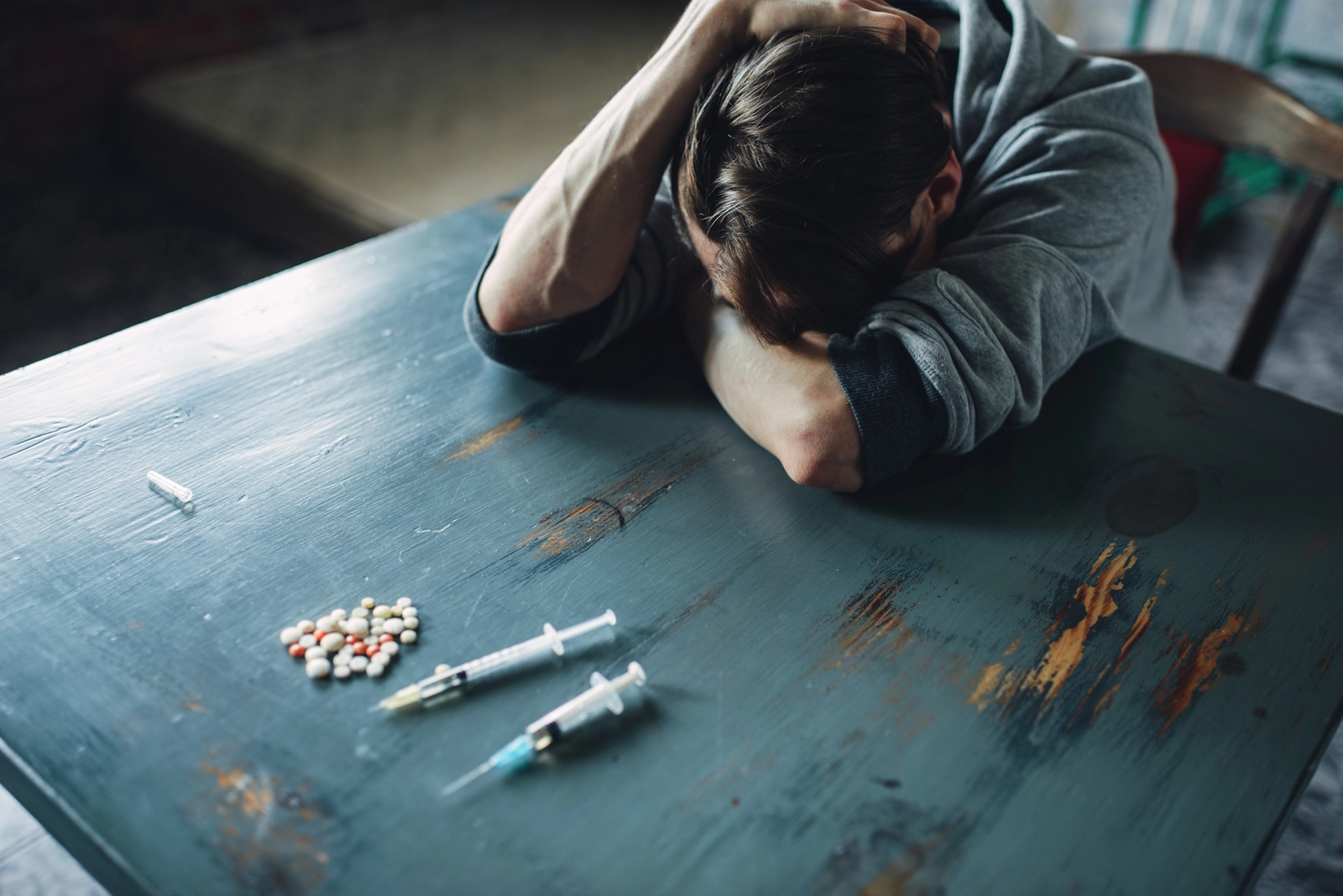Withdrawal | 4 min read
Can You Die from Drug Withdrawal? Symptoms and Risks
Medically Reviewed By

On September 1, 2024
Written By

On September 1, 2024

What you will learn
- Drug and alcohol withdrawal happens when you quit a substance after regular use.
- Drug withdrawal symptoms vary by substance and other factors, but they have some common symptoms.
- Some drug withdrawal syndromes can be life-threatening, including alcohol, benzos, and opioids.
- Some drugs that aren’t considered addictive, such as steroids, can cause dangerous withdrawal and should be tapered.
- Medical detox is recommended to manage withdrawal symptoms and prevent complications.
Drug and alcohol withdrawal occurs when you quit a substance after heavy use for prolonged periods. While withdrawal from any substance can cause unpleasant symptoms, some drug withdrawal syndromes can be potentially deadly without intervention.
Can you die from drug withdrawal? It depends on the substance involved. Learn more about drug withdrawal, dangerous drug withdrawal syndromes, and what treatments are available.
What Is Drug Withdrawal?
Drug withdrawal is a set of symptoms that occur when you stop using a drug that you’ve become dependent on. This can occur with illicit drugs, prescription medications, or some medications that aren’t necessarily addictive.
Dependence occurs when your body becomes used to the presence of a drug after you’ve used it for extended periods or in high doses. When you stop taking it, withdrawal symptoms occur as your body tries to readjust to not having the drug. Withdrawal symptoms can be mental and physical, depending on the substance involved.
Drug Withdrawal from Different Drugs
Different types of drug withdrawal syndromes have different risks and symptoms. Some are uncomfortable and prolonged but not life-threatening, while others can carry the risk of dangerous complications that can lead to death.
Alcohol Withdrawal
Alcohol is known to cause severe withdrawal with serious and potentially life-threatening symptoms. Some of the symptoms of alcohol withdrawal include:[1]
- Excessive sweating
- Anxiety
- Dehydration
- Tremors
- Elevated blood pressure
- Increased heart rate
- Insomnia
- Nausea and vomiting
- Diarrhea
- Seizures
Alcohol withdrawal can also cause delirium tremens, a set of severe symptoms that include shaking, confusion, and hallucinations. Delirium tremens can cause a sudden, extreme spike in blood pressure and seizures that can be fatal.
Benzodiazepine Withdrawal
Benzodiazepines are central nervous system depressants that treat anxiety, seizures, and sleep disorders. Taking benzos for extended periods or at high doses can cause dependence, leading to withdrawal symptoms like:[2]
- Insomnia
- Anxiety
- Restlessness
- Agitation
- Irritability
- Memory and concentration problems
- Muscle aches and pain
In rare cases, benzo withdrawal can cause seizures, which may be fatal.
Opioid/Opiate Withdrawal
Opioids and opiates are highly addictive substances that may be prescription medications or drugs of abuse, such as morphine, oxycodone, hydrocodone, heroin, and fentanyl. Opioids are naturally derived from the opium poppy, such as morphine, while opioids are synthetic or semi-synthetic versions like fentanyl. They’re often collectively referred to as opioids.
Some of the opioid withdrawal symptoms include:[3]
- Nausea
- Vomiting
- Anxiety
- Hot flashes
- Insomnia
- Sweating
- Muscle cramps
- Runny nose and eyes
- Yawning
- Diarrhea
Opioid withdrawal is often thought of as extremely uncomfortable but not life-threatening in itself, though it can lead to potentially fatal complications, such as dehydration and electrolyte imbalances. However, complications that lead to death can occur. Left untreated, persistent vomiting and diarrhea may lead to dehydration, elevated blood sodium levels, and possible heart failure.[4]
Stimulant Withdrawal
Withdrawal from stimulants like methamphetamine or cocaine is generally a less dangerous type of withdrawal that isn’t associated with serious symptoms. Stimulants usually bring a “crash” after stopping the use of the drug, causing severe fatigue that lasts several days.
Other symptoms of stimulant withdrawal include:[5]
- Itchy eyes
- Difficulty sleeping
- Decreased motivation
- Low energy
- Paranoia
- Decreased libido
- Increased appetite
The symptoms of stimulant withdrawal tend to be psychological more than physical and may last several weeks – or even months. Complications that lead to death are unlikely, though the psychological effects can cause severe depression and suicidal ideation.
Marijuana Withdrawal
Cannabis is commonly used and legalized in many states and jurisdictions, but there’s growing evidence that it can be addictive with chronic use. People who use marijuana for extended periods can experience withdrawal symptoms like:[6]
- Irritability
- Aggression
- Anxiety
- Depression
- Sleep difficulties
- Low appetite
- Agitation
- Headache
- Stomach pain
- Fever
- Chills
- Sweating
Marijuana withdrawal is unlikely to be dangerous. The symptoms can be persistent and uncomfortable, however, making it difficult to quit cannabis.
Nicotine Withdrawal
Though legal, nicotine is highly addictive – equal to illegal drugs like heroin. Nicotine withdrawal makes smoking or using tobacco difficult to overcome, but it’s not usually life-threatening. The symptoms of nicotine withdrawal may include:[7]
- Intense hunger
- Cravings
- Persistent cough
- Headaches
- Dizziness
- Fatigue
- Insomnia
- Constipation
- Anxiety
- Depression
- Irritability
- Brain fog
If you are trying to quit nicotine, a zero nicotine vape may be helpful, however these still carry some health risks.
Steroid Withdrawal
Several medications that aren’t known to be addictive can still have withdrawal syndromes after regular use, such as some antidepressants and corticosteroids like prednisone. This is due to physical dependence, not addiction.
Corticosteroid withdrawal symptoms may include:[8]
- Fever
- Stiff muscles
- Body aches
- Fatigue
- Joint pain
- Fever
- Vomiting
- Weight loss
- Headaches
- Delirium
- Anxiety
- Mood swings
In rare cases, steroid withdrawal can cause an adrenal crisis, a possibly fatal reaction to the lack of steroid hormones in the body.[9] Steroid doses should always be tapered down to reduce the risk of severe withdrawal symptoms.
Polysubstance Withdrawal
Polysubstance abuse involves more than one substance used at the same time. With multiple drugs involved, withdrawal can be more complicated and unpredictable. The combination of withdrawal symptoms can increase the risk of experiencing dangerous complications, even if the individual drugs involved aren’t typically associated with life-threatening withdrawal symptoms.
Can Drug Withdrawal Be Dangerous?
As mentioned, withdrawal from alcohol, benzodiazepines, opioids, and steroids can have increased risks compared to other drugs. Some drugs, such as stimulants, have intense psychological symptoms that may increase the risk of suicide.
With any drug, the risk of relapse during withdrawal is high. People may relapse to relieve uncomfortable symptoms, restarting the cycle of addiction. in addition, relapsing after quitting a drug can increase the risk of an overdose, as people may take higher doses than their bodies can handle.
Medical Detox for Drug Withdrawal
It’s never recommended to quit drugs on your own. In the case of dangerous withdrawal syndromes like alcohol, quitting at home can cause serious complications, but any drug withdrawal can be difficult to overcome without help.
Medical detox is the best choice for undergoing drug withdrawal. In this setting, you have a medical team to monitor your health, minimize withdrawal symptoms, and reduce the risk of complications and relapse while the drug clears your system.
Once detox is complete, it’s important to enter an addiction treatment program to address the psychological causes of drug and alcohol addiction. The treatment is tailored to your mental health and substance abuse history. However, it may include treatments like individual and group counseling, holistic therapies, evidence-based modalities, and medication-assisted treatment (MAT) as needed.
Get Help for Drug Addiction and Withdrawal
Drug withdrawal is part of why addiction is so difficult to overcome, especially without help. If you or a loved one is struggling with addiction, it’s important to seek out a medical detox program to manage withdrawal symptoms and prevent dangerous complications – especially with drugs like alcohol or benzos.
Frequently Asked Questions About Drug Withdrawal
The more serious symptoms of alcohol withdrawal, such as delirium tremens and seizures, can lead to death. While these risks are relatively rare, it’s recommended to detox from alcohol with medical supervision to reduce the risk of serious symptoms.
Benzodiazepines can be dangerous to quit suddenly. Stopping benzos after chronic use, even with a prescription, can cause seizures or rhabdomyolysis, a life-threatening condition that causes damaged muscle tissue to release protein and electrolytes into the bloodstream, impacting the kidneys.
While not often thought of as dangerous, opioid withdrawal can have intense symptoms that can lead to life-threatening withdrawals. The persistent vomiting and diarrhea that occurs with opioid withdrawal can cause dangerous electrolyte imbalances, possibly leading to heart failure.
Withdrawal symptoms vary by substance and level of dependence, but the three substances known for uncomfortable and sometimes dangerous withdrawal syndromes are alcohol, benzos, and opioids.
Delirium tremens, also known as the DTs, is the most severe form of withdrawal and may occur with alcohol withdrawal. DTs have a high mortality rate and are considered a medical emergency.
Some drugs are particularly dangerous to stop taking suddenly if you’ve been using them for a prolonged period, such as alcohol and benzos. However, some drugs that aren’t considered addictive can cause dependence and withdrawal, such as clozapine, lithium, and prednisone.[10] These drugs should be tapered as recommended by a doctor to reduce withdrawal symptoms.
Detox flu, also known as ‘withdrawal sickness,’ is a term used to describe the flu-like symptoms that can occur when you detox from drugs like opioids and alcohol. The symptoms vary but may include fatigue, nausea, headaches, chills, digestive issues, muscle pain, and fever.
Take Control of Your Recovery
Our team is here to guide you with compassionate, evidence-based support. Connect with Ascendant New York today.
Ascendant New York Editorial Guidelines
Here at Ascendant New York, we understand the importance of having access to accurate medical information you can trust, especially when you or a loved one is suffering from addiction. Find out more on our policy.
[1] WebMD. (n.d.-b). Alcohol withdrawal: Symptoms, treatment and alcohol detox duration. WebMD. Retrieved from https://www.webmd.com/mental-health/addiction/alcohol-withdrawal-symptoms-treatments on 2024, July 24.
[2] MediLexicon International. (n.d.-a). Benzo withdrawal: Timeline and symptoms. Medical News Today. Retrieved from https://www.medicalnewstoday.com/articles/benzo-withdrawal on 2024, July 24.
[3] Shah, M. (2023, July 21). Opioid withdrawal. StatPearls [Internet]. Retrieved from https://www.ncbi.nlm.nih.gov/books/NBK526012/ on 2024, July 24.
[4] S. D. (n.d.-a). Yes, people can die from Opiate withdrawal. NDARC. Retrieved from https://ndarc.med.unsw.edu.au/blog/yes-people-can-die-opiate-withdrawal on 2024, July 24.
[5] Stimulant withdrawal. PsychDB. (2021b, March 29). Retrieved from https://www.psychdb.com/addictions/stimulants/3-withdrawal on 2024, July 24.
[6] MediLexicon International. (n.d.-d). Marijuana withdrawal: Symptoms, timeline, and tips for coping. Medical News Today. Retrieved from https://www.medicalnewstoday.com/articles/324301 on 2024, July 24.
[7] WebMD. (n.d.-g). Nicotine withdrawals: Symptoms, side-effects, and duration. WebMD. Retrieved from https://www.webmd.com/smoking-cessation/understanding-nicotine-withdrawal-symptoms on 2024, July 24.
[8.9] WebMD. (n.d.-g). How to manage Prednisone withdrawal. WebMD. Retrieved from https://www.webmd.com/rheumatoid-arthritis/prednisone-taper on 2024, July 24.
[10] Withdrawal effects of benzodiazepines – mind. (n.d.-e). Retrieved from https://www.mind.org.uk/information-support/drugs-and-treatments/sleeping-pills-and-minor-tranquillisers/withdrawal-effects-of-benzodiazepines/ on 2024, July 24




